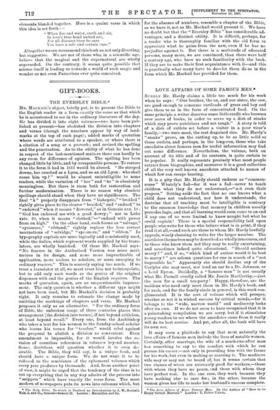GIFT-BOOKS.
THE EVERSLEY BIBLE.* MAciciat's object, briefly put, is to present the Bible to the English reader in a form exactly the same as that which he is accustomed to see in the ordinary literature of the day. He has divided it into eight volumes—two have been pub- lished at present—has abolished the division into chapters and verses (though the numbers appear by way of land- marks at the top of each page); added marks of quotation where words are attributed to a speaker, or where there is a citation of a song or a proverb ; and revised the spelling and the punctuation. As to the utility of what he has done in respect of the last-mentioned matters there can hardly be any room for difference of opinion. The spelling has been changed little by little, and by irresponsible persons. To restore it to the form it had in 1611 would be absurd. "He stouped down, hee couched as a Lyon, and as an old Lyon who shall rouse him vp ? " would be almost unintelligible to some readers, while the variation of " hee" and " he" is absolutely meaningless. But there is room both for restoration and further modernisation. There is no reason why obsolete spellings should stand when they have no significance. The final " k " properly disappears from "bishopric," " broided " rightly gives place to the clearer " braided," and "endued " to " endowed" when it means " dowered," as in Genesis xxx. 10 : " God has endowed me with a good dowry ; " not in Luke xxiv. 49, when it means " clothed,"—" endued with power from on high." On the other hand, such forms as " salvage," "sycamore," " ribband," rightly replace the less correct usurpations of " selvidge," " sycomore," and " ribbon." In typography capitals are more logically and consistently used, while the italics, which represent words supplied by the trans- lators, are wholly banished. Of these Mr. Mackail says : "No feature in the Authorised Version was more meri- torious in its design, and none more impracticable of application, more useless to scholars, or more annoying to ordinary readers." This is scarcely saying too much. If we trust a translator at all, we must trust him not to interpolate, but to add only such words as the genius of the original dispenses with and the genius of the English requires. The marks of quotation, again, are an unquestionable improve- ment. The only question is whether a different type might not have been used, but Mr. Mackail's decision is probably right. It only remains to estimate the change made by omitting the markings of chapters and verse. Mr. Mackail proposes it only as an alternative. " For the ordinary form of Bible, the unbroken usage of three centuries places this arrangement [the division into verses], if not beyond criticism, at least beyond recall." Every one, from the Archbishop who takes a text for his sermon to the Sunday-school scholar who learns his verses for "teacher," would rebel against the proposal to abolish a division so convenient. Even amendment is impossible, for it would involve the re- vision of countless references in volumes beyond number.
Some, doubtless, will question whether it is even de- sirable. The Bible, they will say, is a unique book, and should have a unique form. We do not want it to be reduced to the semblance of the ephemeral volumes which every year produces by thousands. And, from another point of view, it might be urged that the tendency of the time is to cut up everything that in any way admits of the process into " snippets " which have exactly the verse form. The most modern of newspapers puts its news into columns which, but
• The Holy Ba.le. To which is Prefixed an Introduction by J. W. Mackail, Vole, I, and IL, Ctoneala--1.9amnol II. London : Macmillan and Co.
for the absence of numbers, resemble a chapter of the Bible, as we have it, not as Mr. Mackail would present it. We have no doubt but that the " Eversley Bible" has considerable ad- vantages,' and a distinct utility. It is difficult, perhaps, for a reader who is thoroughly familiar with the old form to appreciate what he gains from the new, even if he has no prejudice against it. But there is a multitude of educated persons, many more, we are convinced, than there were half a century ago, who have no such familiarity with the book. If they are to make their first acquaintance with it—and this is practically what many have to do—let them do so in the form which Mr. Mackail has provided for them.






















































 Previous page
Previous page